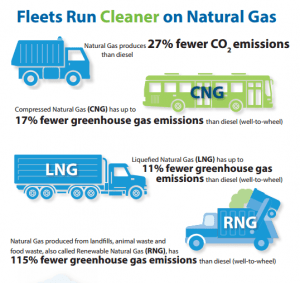NGVAmerica, the national trade association dedicated to developing a sustainable market for natural gas vehicles (NGVs), says its Emissions and Environmental Working Group has released a new white paper and infographic highlighting the benefits for fleets that use natural gas as a transportation fuel.
According to NGVAmerica, the group’s goal was to provide the NGV industry with a complete, supported consensus document on the benefits of switching to natural gas, including compressed natural gas (CNG) and liquefied natural gas (LNG). Specifically, the infographic provides high-level environmental benefits, while the white paper goes into more detail and provides definitions, assumptions and sources for the results.
“Lower greenhouse-gas and environmental-related emissions are priorities for shippers, trucking fleets, municipal refuse vehicles and transit buses across the country. Natural gas provides clear advantages among alternative transportation fuels,” the white paper states. “This document was created to explain the emission and environmental benefits associated with CNG and LNG, as well as the technical reasons behind the calculations and inputs that were chosen.”
The white paper then goes on to identify the environmental benefits of natural gas:
- Combusting natural gas produces 27% fewer CO2 emissions than diesel fuel on an energy equivalent basis;
- CNG in heavy-duty vehicles has 13% to 17% fewer greenhouse-gas emissions compared with diesel on a well-to-wheel basis;
- LNG in heavy-duty vehicles has 6% to 11% fewer greenhouse-gas emissions over diesel on a well-to-wheel basis; and
- Near-zero natural gas engines produce 95% fewer nitrogen oxide emissions than the current standards.
The document then notes that natural gas engine manufacturers are working to improve the design and operation of natural gas engines, looking for ways to not only improve emissions, but also advance efficiency when using spark-ignited and high-pressure direct injection fuel delivery systems. NGVAmerica specifically notes High Pressure Direct Injection engine technology, which the document says is “able to maintain equal horsepower, torque and efficiency as a comparable diesel engine.”
The trade association also touts renewable natural gas (RNG), saying, “The transportation sector is poised to benefit from RNG where it can be used to directly replace conventional fuels and can be used without any changes to CNG or LNG fuel systems. When using RNG in transportation, well-to-wheel greenhouse-gas emissions can be reduced by 80% to 115%, depending on the source.”
As reported, it is estimated that approximately 20% of all natural gas for on-road transportation is RNG, and half of natural gas used for road transportation in California is RNG. NGVAmerica expects this number will continue to grow as the industry seeks new and efficient ways to develop the renewable fuel.
Further, the white paper notes that in addition to the vehicles themselves, the refueling stations can also produce emissions. CNG station manufacturers are using advanced materials and component designs to limit “fugitive emissions,” along with enhanced sealing methods for gas tubing and fittings. Major components such as compressors are also equipped with methane detectors that will shut down the station if a predetermined methane level is reached.
NGVAmerica says it intends for these documents to serve as a resource for its members and the industry at large when discussing the benefits of using NGVs.








